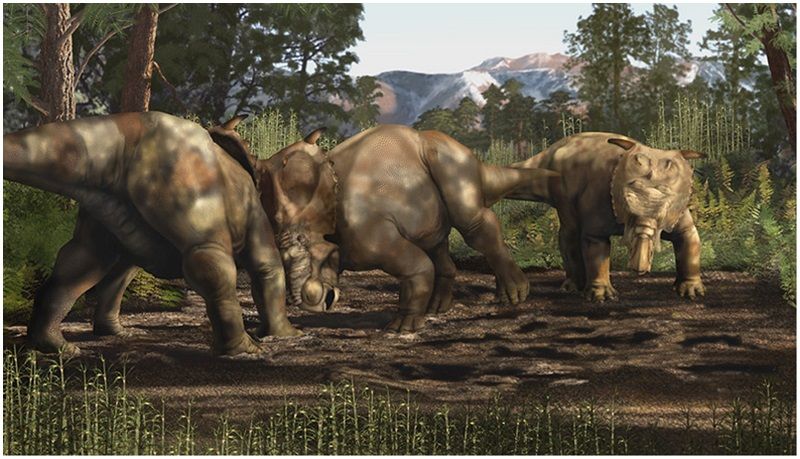A pair of adult T-Rexes are on the hunt.
一对成年霸王龙出去狩猎。
They must leave their babies unguarded.
它们只能留下它们的孩子们。
The juveniles are unaware of approaching danger.
幼龙们没意识到正在接近的危险。
Leaving their young is a very risky thing.
把幼龙留下是非常危险的事情。
They understand that there's dangers out there.
它们明白这样有危险。
But they've got to leave the young long enough to go out and hunt for prey.
不过它们必须离开幼龙够久才能捕获到猎物。

Traveling in search of prey, the adults could be gone for a long time.
一路寻找着猎物,成年霸王龙们会离开较长时间。
The adults have left a series of scent marks.
成年霸王龙们会留下气味痕迹。
They outline boundaries for the juveniles to stay within and to keep out all other dinosaurs.
它们为其幼龙围出了活动范围,防止所有其它恐龙的进入。
Most dinosaurs are repelled by this pungent scent, and retreat.
多数恐龙闻到这刺鼻味道就会撤退。
But one dinosaur in particular uses these scent marks as a homing device.
不过有一种恐龙却把这种味道当做定位装置。
Nanotyrannus actively hunts and kills young Tyrannosaurs.
矮暴龙会主动搜寻猎杀幼霸王龙。
Not to eat, but to get rid of the competition.
不是为了食物而是要消灭竞争对手。
These two unguarded juveniles are at the mercy of this tyrant killer.
这两头不受保护的幼龙就要面临这头残暴杀手的攻击了。
A Nanotyrannus knows he's no match for a fully grown T-Rex.
矮暴龙知道自己不是成年霸王龙的对手。
He makes sure the adults are gone before he moves in for the kill.
它在靠近发动袭击前确定了成年霸王龙不在。
The two juvenile instinctively know that a predator approaches.
两头幼龙本能地知道有掠食者靠近了。
They're too young to have ever seen a Nanotyrannus, but it doesn't matter.
它们太年幼,还没见过矮暴龙,不过这无所谓。
They're hardwired to recognize a threat and face it head on.
它们的本能让它们能意识到威胁,并且直面挑战。
The Nanotyrannus doesn't just haphazardly attack.
矮暴龙不会随意地发动进攻。
These young Tyrannosaurs have a special defensive mechanism, a mouthful of bacteria.
这些幼霸王龙有特别的防御机制——满嘴的细菌。
The Nanotyrannus knows that a nip from a young Tyrannosaur could potentially end its life.
矮暴龙知道被幼霸王龙咬上一小口就可能会让它没命。
These are the first animals to use biological weapons.
这些是最早会用生物武器的动物。












